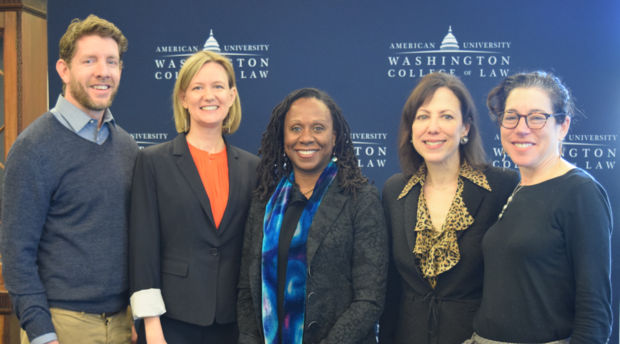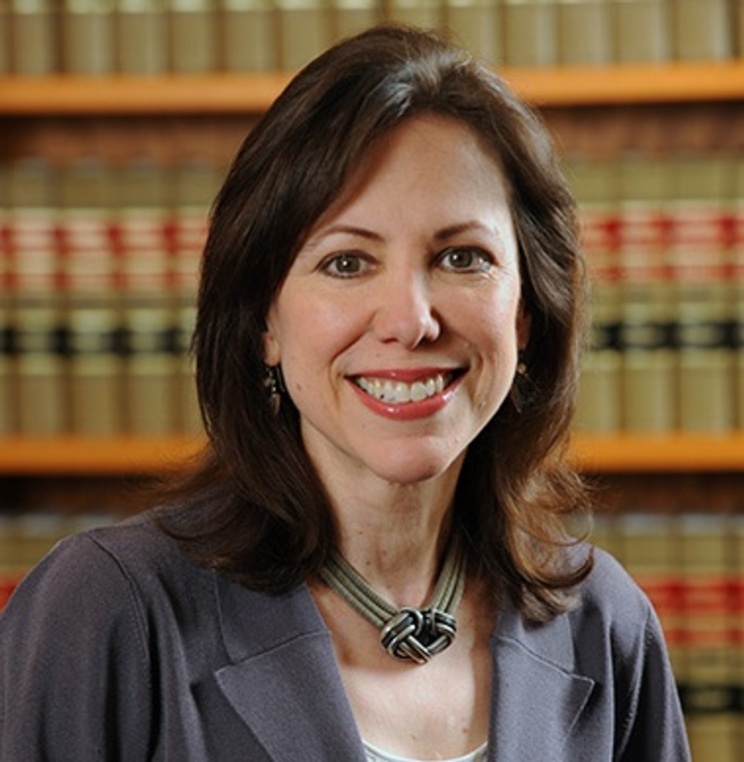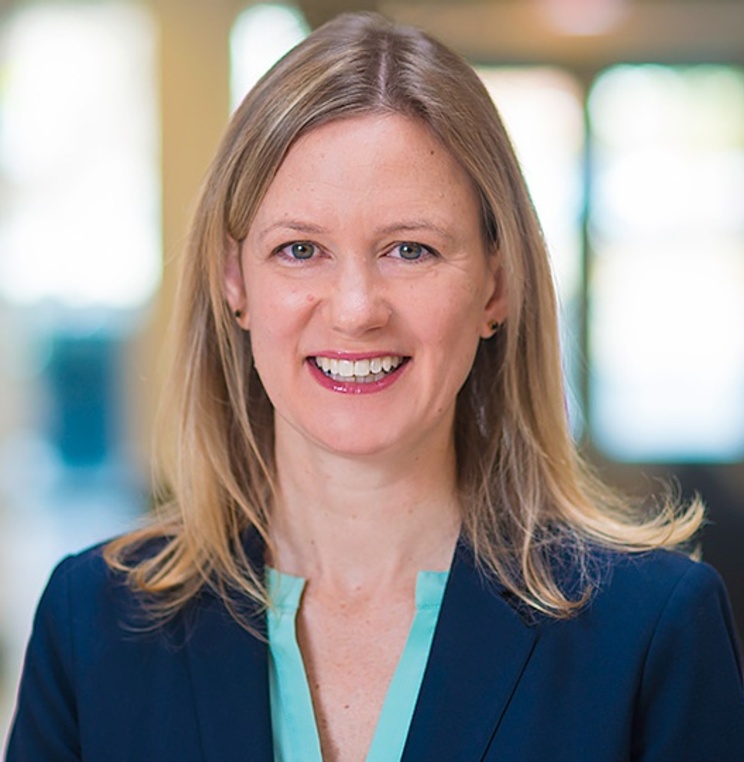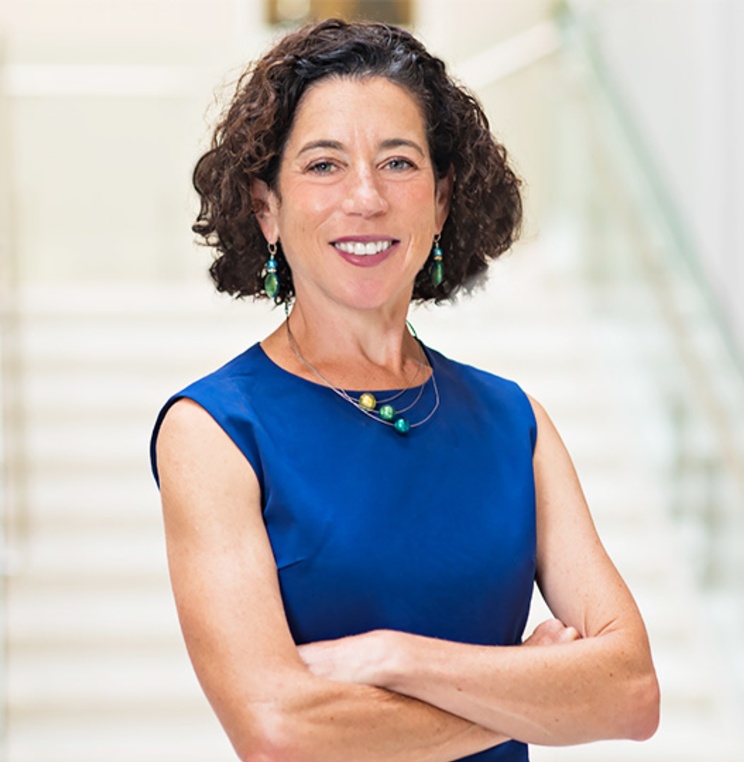Four AUWCL Professors Recognized for Outstanding Scholarship
Jan. 29, 2020

Four professors at American University Washington College of Law were honored Wednesday, Jan. 29 as winners of the annual Faculty Scholarship Awards. Dean Camille Nelson was on hand to celebrate the accomplishments of her faculty colleagues.
Awardees are recommended by a committee composed of the previous year's winners. This year’s committee was composed of Professors Jenny Roberts (chair), Susan Franck, and Heather Hughes.
Pauline Ruyle Moore Scholar Awards
The Pauline Ruyle Moore Scholar Award was established in honor of AUWCL alumna Pauline R. Moore by her husband to recognize an outstanding scholar each year in the area of public law.
Professor Diane Orentlicher
Professor Diane Orentlicher is the author of Some Kind of Justice: The ICTY’sImpact in Bosnia and Serbia, Oxford University Press (2018). Some Kind of Justice provides an in-depth, longitudinal account of the Hague Tribunal’s impact in two countries directly affected by its work—Serbia, whose wartime leader plunged the former Yugoslavia into vicious ethnic conflict, and Bosnia-Herzegovina (“Bosnia”), which endured the highest levels of brutality during the conflicts that gave rise to the ICTY.

Building on hundreds of interviews by Orentlicher, the book highlights the perspectives of Bosnian and Serbian citizens, while drawing on a rich body of inter-disciplinary research to deepen their insights about the Tribunal’s local impact. The book is the only work of scholarship that tracks an international court's local impact over an extended period of its operation, having tracked it for nearly a quarter century. Some Kind of Justice explores the Tribunal’s evolving impact in Bosnia and Serbia in three principal ways: answering victims’ need for retributive justice; dispelling widespread denial of wartime atrocities; and catalyzing domestic accountability processes.
Orentlicher, one of the world’s leading authorities on human rights law and war crimes tribunals, said the book avoids the typical pattern of most texts about international criminal courts, which either take an overwhelmingly cynical or idealistic approach.
“The book instead identifies myriad respects in which early expectations of the ICTY were unrealistic, while clearly demonstrating its overall success in meeting others,” she said. “And while identifying flaws in the Tribunal's performance, it identifies concrete ways in which those flaws could be addressed by contemporary international tribunals still operating.”
Professor Rebecca Hamilton
“User-Generated Evidence,” Columbia Law Journal of Transnational Law (2018), was the first article to assess how such "user-generated evidence" is changing the field of international criminal investigations. With much work being done to harness the benefits of digital evidence collection, there is a lot of techno-optimism is this space. New UN mechanisms are being created to do digital documentation, even in advance of any court being available to use the evidence. In "User-Generated Evidence," Professor Rebecca Hamilton acknowledges the positive potential of this work, but also identifies the significant risks it brings – to the security of victims and witnesses, and to the fair trial rights of defendants. She emphasizes that the advent of user-generated evidence is not simply about a new form of evidence but, more significantly, about bringing new actors, including technology companies, into international criminal investigations.

In 2017, the International Criminal Court relied on user-generated evidence for the first time, issuing an arrest warrant for the war crime of murder, following video footage of executions committed in a public square. "But what of the sexual assaults taking place outside public view, or the torture committed inside government detention facilities?" asks Hamilton. "Could it be the case that actions susceptible to capture on cell phone are more likely to be those of the foot soldier carrying out a crime, than of the politician involved in masterminding it? In short, will courts begin to neglect—either deliberately because it’s easier, or simply because of a prohibitive workload—the types of crimes, perpetrators, and victims that are less likely to be captured by user-generated evidence?"
Hamilton said “User-Generated Evidence” is a bridge from her previous work in international criminal law and her increasing focus on the roles and responsibilities of technology companies— in particular, social media platforms.
“Linking the two is my constant concern about the on-the-ground impact for those who are most marginalized in their societies,” Hamilton said. “My current work, “Governing the Global Public Square,” brings case studies from the Global South into what has been a highly U.S. and EU-centric conversation about online content regulation. And I'm taking the same methodological approach with a companion piece, “First Amendment Evangelism,” which is a critique of the push to make U.S. free speech norms the global standard.”
Edwin A. Mooers Scholars
This award was established in 1985 in honor of former Professor Mooers, for support to an AUWCL faculty member in any area of law.
Professor Jonas Anderson
In “Court Capture,” Boston College Law Review (2018), Professor and Associate Dean for Scholarship Jonas Anderson examines whether a phenomenon about which administrative law has long been focused (capture) is something that could also infect the federal courts. Capture is the phenomenon in which administrative agencies come to serve the industry that they are meant to regulate.

Anderson’s article discusses the same concern, only examining the federal courts as the “agency” being captured. In “Court Capture,” Anderson concludes that some—but not all—of the things that worry us about agency capture could—and have—occur with courts. The article uses the example of the Federal District Court for the Eastern District of Texas, which Anderson claims exhibits some of the hallmarks of capture: it has a revolving door between judges and patent law firms, it gets benefits from having lots of patent cases yet the only way it attracts patent cases is by offering more favorable rulings than other courts, and it has an overly cozy relationship with the lawyers who argue before the court.
“Court Capture” is the latest in Anderson’s study of the downsides of specialization in the federal courts.
“Focusing mostly on patent law (but drawing from bankruptcy and antitrust law among others) this broader project has exposed the negative side of what most observers previously viewed as an unalloyed good; specialization. Among the downsides I have exposed are the tendency of specialized courts to favor plaintiffs, the blurring of the lines of separation of powers between the legislative and judicial branch, undermining judicial impartiality, and questioning the legitimacy of judicial review,” Anderson explained. “All this work (after one last article that is in process) will result in a book, tentatively titled When Courts Go Shopping for Plaintiffs: Court Competition among the Federal Courts.”
Professor Jennifer Daskal
Professor Jennifer Daskal’s “Borders and Bits,” Vanderbilt Law Review (2018), discusses the ways in which governments and the private sector seek to manage data as it flows across borders. Whereas data transits the globe without any intrinsic ties to territory, the governments that seek to access or regulate this data operate with territorial-based limits. Daskal, director of AUWCL’s new Tech, Law, & Security Program, tackles the inherent tension between how governments and data operate, the jurisdictional conflicts that have emerged, and the power that has been delegated to multinational corporations that manage our data across borders as a result.

The article addresses this tension through the lens of the highly contested and often conflicting approaches to the jurisdictional reach of law enforcement over data, the so-called right to be forgotten, and a range of other privacy regulations. “Borders and Bits” highlights the flaws with the straightforward application of old jurisdictional rules onto the new medium of data and shines a spotlight on the unilateral rulemaking by powerful states and the powerful multinational companies that manage our data—which in turn puts private, multinational companies increasingly in control of whose rules govern and thus the substance of both privacy and speech rights on a global, or near-global, basis.
“I continue to build on this work in other scholarship, including my recently published Virginia Law Review piece, “Speech Across Borders.” It is also forming the foundation, in part, of a current book project, tentatively tilted The Right Way to Censor,” Daskal said. “In addition, I have been invited to present the paper at numerous academic conferences and it has led to multiple invitations and speaking engagements at policy-focused events as well, including, but not limited to, the Internet Governance Forum, CSIS, hill briefings, and ABA-sponsored events.”